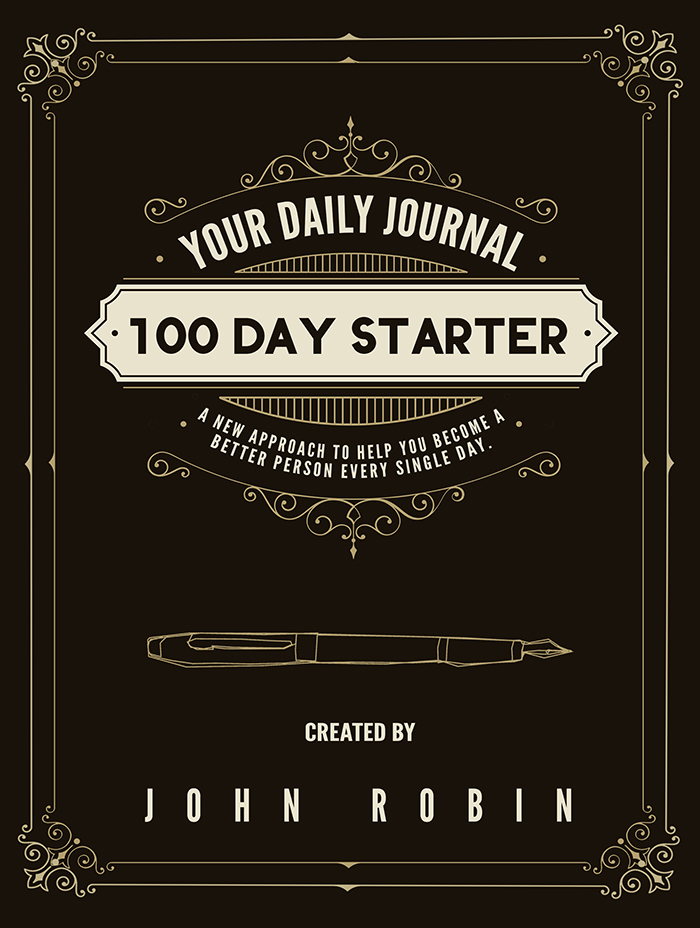My guest today is Joseph G. Calcagno, author of The Defeated, currently funding on Inkshares.
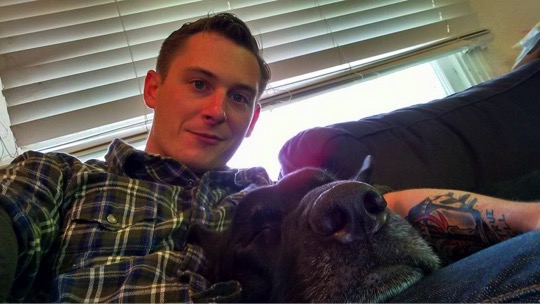 Joseph G. Calcagno is a fantasy author who hails from green mountains and learned from a wizard in his youth. He loves the wilderness, swordplay, his wife, and his dogs. With a degree in Anthropology, a background of service in the United States Army, a passion for history, and a healthy supply of gallows humor, he enjoys few things more than sculpting worlds and making biting commentary on their inevitable corruption and the lunacy of their wars.
Joseph G. Calcagno is a fantasy author who hails from green mountains and learned from a wizard in his youth. He loves the wilderness, swordplay, his wife, and his dogs. With a degree in Anthropology, a background of service in the United States Army, a passion for history, and a healthy supply of gallows humor, he enjoys few things more than sculpting worlds and making biting commentary on their inevitable corruption and the lunacy of their wars.
Here now are Joseph’s insights on world building.
What is the appeal of world building to you? How does it compare to the importance of character and plot?
Well, world building is the foundation of it all, isn’t it? It’s a tough question to tackle adequately, but I’ll do my best. Interesting plots, believable ones, are dependent on the decisions of fully realized characters. I’ve always held flagrant distaste for the idea of characters that are simply vessels for a plot. They feel hollow and the plot is cheapened.
You don’t say, “Person A is going to do thing C if getting them to that conclusion is adverse to how they would react in situation B,” so to speak. It doesn’t matter how desperately you want “thing C” to happen if Person A just wouldn’t make that happen. Your plot needs to be a tightly knit thing, but it needs to occur naturally. If you don’t allow for real characters to make real, natural decisions to achieve a natural conclusion, you end up reliant on characters that merely exist as a plot device or the ever-dreaded Deus Ex Machina. I hate both those things, but this all leads me back to the point of your question.
These people, and to me, my characters, are people with whom I maintain a very real, albeit unhealthy, relationship entirely in my head, are characterized by how they have reacted to the world in which they live. The world didn’t entirely shape them, but it influenced their development. They didn’t hatch from holes in the ground ready to tackle a specific adventure. So the world is the foundation of all of it. The world needs to be real, and natural place – I’m sorry I keep using those words but they’re the fulcrum of it all – for authentic characters to exist and interact within it.
After that, after these circumstances of a genuine, breathing world and the actions of characters behaving in fashion true to their identities coalesce, that’s where you derive your plot. This feature of the world is doing this thing, and this person who has experienced parts X,Y,Z of this world is involved. What happens naturally? That’s your plot. So first comes the world, then the characters, then the plot. It’s the primordial soup from which the life of your work evolves.
What aspects of the world do you have to figure out before you start a story? What do you allow to unfold as you write?
I’ll answer the second part of the question first, if I might. I like to slip things in naturally. Readers don’t need to read the Silmarillion to understand the Hobbit. It adds to it, yes, but my preferred method is revealing little events, little tidbits of history or literature that are a part of that world through the points of view of the various characters. In The Defeated, for instance, Cyprian makes a few references to the work of certain philosopher. The references allow both glimpses into his state of mind, cement authentically that he is from an educated background to have read these works, and deepen the world for the reader. It serves to characterize both world and character simultaneously. I think almost every reader enjoys having a mystery that unfolds as they dive deeper and deeper into the story, and I prefer to treat the world as such. I always intend to throw my readers into the action and let the hints, clues, and expositions flow organically as they progress.
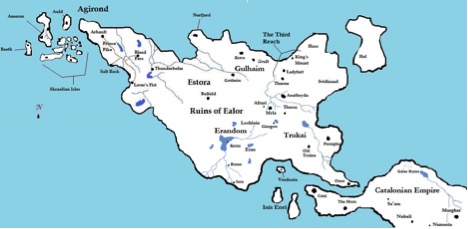 As for part one of the question, I’m a history nerd with a tendency to obsess. For The Defeated I had years upon years of developing the world before that particular tale was a proverbial twinkle in my eye. All of the characters existed prior in adventures either written or in my head, and this particular plot just happened to involve all of them. I start with the geography, usually. That old trope of the fantasy author and his/her maps. Once I have the natural features, it’s an easy jump to decide what cultures would develop where and what they are all about. You don’t have a coastal city with no shipping, to boil it down to the simplest. How would geography affect the people living in these areas?
As for part one of the question, I’m a history nerd with a tendency to obsess. For The Defeated I had years upon years of developing the world before that particular tale was a proverbial twinkle in my eye. All of the characters existed prior in adventures either written or in my head, and this particular plot just happened to involve all of them. I start with the geography, usually. That old trope of the fantasy author and his/her maps. Once I have the natural features, it’s an easy jump to decide what cultures would develop where and what they are all about. You don’t have a coastal city with no shipping, to boil it down to the simplest. How would geography affect the people living in these areas?
Once you figure the natural growth of people in a place, that’s when you can start working on culture. Everything’s important! Imports, exports, forms of government, religion, customs, etc. After that you can work on your histories. How did all these fictitious peoples you’ve spawned interact over the breadth of millenia and what does that mean for rivalries, alliances, feuds.
Then you pluck up a character from a place, and you have her/his people’s whole history already in your head. Then you develop their personal history and set them loose to play with your world.
Long story short – before I’m comfortable starting the story, I feel a need to develop as much about the world as possible.
Do you have a technique for keeping track of world-building as you go? How do you ensure your material is easily retrievable and easy to modify?
Endless notebooks, journals, sketchpads, and the corresponding computer files.
What do you enjoy the most about world building?
The beauty of world-building is that anyone with imagination, motivation, and a little bit of talent can fashion this whole alternative place. It’s like a tabletop RPG done properly, or building a city out of LEGO blocks and playing with the people inside. And the profound glory of this is that you can use analogs to say something about the real world in which you live. If you don’t like certain aspects of your government, if you feel an aura of hopelessness in a crumbling economy, you can satirize it, lampoon it. If you do it right it’s both therapeutic and doesn’t come off as preachy. Added bonus: you get to make it an adventure instead of humdrum drudgery. Like most things in modern fantasy, that started with Tolkien too.
Describe your world and some of the considerations behind it that you feel give your stories a solid sense of realism:
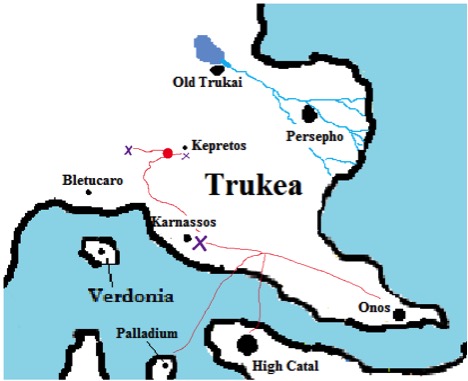 This is an intimidating question, because trying to consolidate all that work into a succinct response seems an impossible task. Which is exactly why I’m going to try. For one, I built my world in much the same order as the real world. First the geography, then the natural progression of culture, economy, and history based on that geography. Most recently come these interesting characters to pop up and appear in an exciting tale. The considerations that realize it are much the same as that. From largest to smallest – what is the world itself doing and what are the physics here? What are these kingdoms and nations and city states doing – what are their objectives and intentions? Lastly, but most importantly, what are the personal motivations of the characters involved. It’s a place of corruption and selfishness and political upheaval, and here are these poor damned souls caught in the thick of it. But there’s also goodness and humor.
This is an intimidating question, because trying to consolidate all that work into a succinct response seems an impossible task. Which is exactly why I’m going to try. For one, I built my world in much the same order as the real world. First the geography, then the natural progression of culture, economy, and history based on that geography. Most recently come these interesting characters to pop up and appear in an exciting tale. The considerations that realize it are much the same as that. From largest to smallest – what is the world itself doing and what are the physics here? What are these kingdoms and nations and city states doing – what are their objectives and intentions? Lastly, but most importantly, what are the personal motivations of the characters involved. It’s a place of corruption and selfishness and political upheaval, and here are these poor damned souls caught in the thick of it. But there’s also goodness and humor.
That last one is important. One of the forthcoming stories in Something Like A Hero involves a plot to nationalize the cacao industry so chocolate is made at the source rather than under foreign dominion. A real world issue, certainly, and one that has powerful social implications. And not to make light of real world exploitation, but what that amounts to in the book is a high stakes, high adventure tale of Three Musketeers proportions over candy. It can’t take itself too seriously. A lot of literary worlds forget that in a tight spot, someone is always still cracking wise. That’s what realizes it, and any other fantasy or science fiction work, in my opinion. The madness and the humanity.
Be sure to check out Joseph’s fantasy book, The Defeated:
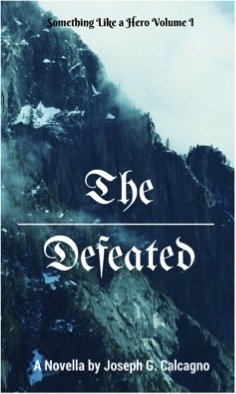 Black Hearts. Black Humor. Black Hats.
Black Hearts. Black Humor. Black Hats.
The Catalonian Legion marches against a decrepit fortress. The scattered remnants of enemy forces who form its garrison rely on the wiles of a half-mad mercenary and his company of treacherous brutes for salvation. Greed. Glory. Guts. At Kepretos, everything that can go wrong just might.
No victory is assured. All will count themselves among The Defeated.
The first novella in Something Like A Hero.
Here is a short excerpt:
Few luxuries soothe the day’s aches so well as a soft place for your arse and a flagon of scrumpy. When an arse is so shapely a thing as Aed’s was, and attached to so finely sculpted a body as Aed’s was, and when that shapely arse and fine sculpted body are in turn below a face so fair and dashingly noble, eyes so charmingly blue, and hair blacker than a starless midnight, all such as Aed’s were, well then, a particularly well-cushioned cushion and only the finest scrumpy will do. At least Aed always thought so.
He surmised that the pillows were Sa’amish. Not quite so fashionable as the Murghar ones he had lounged on the night prior, but spun and sewn by the delicate hands of some desert artisan far away and intended for a consummately exalted arse. Whoever commissioned them, Aed doubted, had an arse with half the exaltedness of Aed’s. It was good he’d stolen them from General Belsar’s baggage train. Otherwise they might never have met the manner of arse for which they were so meticulously crafted.
The scrumpy came from Geritae, west of Karnassos. Orchards in the wooded, hilly lowlands grew the tart apples the scrumpers turned to hard cider. He spent his boyhood in the ragged gray mountains above those very orchards, and the fragrance and flavor that so defined his youth set a tear rolling down his bearded cheek. Scrumpy. From a place called Bletucaro…
A sudden wave of discomfort set him wriggling on the Sa’amish pillows. The masterwork Muntemarro longsword stood most proudly among his possessions, but just now all it was, was in the way. He rocked until the scabbard at his hip slid comfortably in its frog and allowed him the peace to lay down free from annoyance. Just Aedenhrir and his pillows and his scrumpy. He pulled the brim of his black-plumed leather hat down over his face and sipped on his cider.
The sandy red fortress walls, roughly weathered and beyond their prime, drifted from thought. Those walls and half-tumbled turrets, more the skeleton wreckage of defenses than aught else, wrapped like bent bow-limbs to tuck a cluster of ragged wooden buildings safely into the face of the towering mesa behind. A lonely iron gate fixed shut at their center, sneering its black smile beneath the eyes of twin gatehouse towers. Rust flecks on its bars just as blood dripping from cold, jagged teeth.
But Aedenhrir wasn’t considering the stone of his battlements or the metal of the portcullis. Not thinking on how soon they would collapse in a proper siege. Not thinking on it any more than he was thinking on the ten score refugees taking residence in the ramshackle barracks and storehouses nestled within those defenses.
He admired the resilience of these folk. How they yet played music on what instruments they had salvaged from the lives they lived before. How the old baker woman and her kindly niece stoked the fires in the ancient remnants of a forge and used it for a pastry oven. How raucous they could be when they frolicked and drank and danced with Aed’s men and the Trukean soldiers.
Admired them, but wasn’t hardly thinking of them.
Just Aedenhrir. And his pillows. And his scrumpy.
If you’re intrigued, please go over to Inkshares to find out more.
Inkshares is a crowdfunding publisher who chooses which books to publish based on whether enough readers have shown interest in them. Successful projects have been reviewed in the NYT, US Today, and Washington Post, and have been distributed to numerous bookstores including Indigo and Barnes & Noble.
You can connect with Joseph in the following ways:
Facebook: https://www.facebook.com/pages/Joseph-G-Calcagno/256346301207339
Email: jgccalcagno “at” gmail “dot” com

